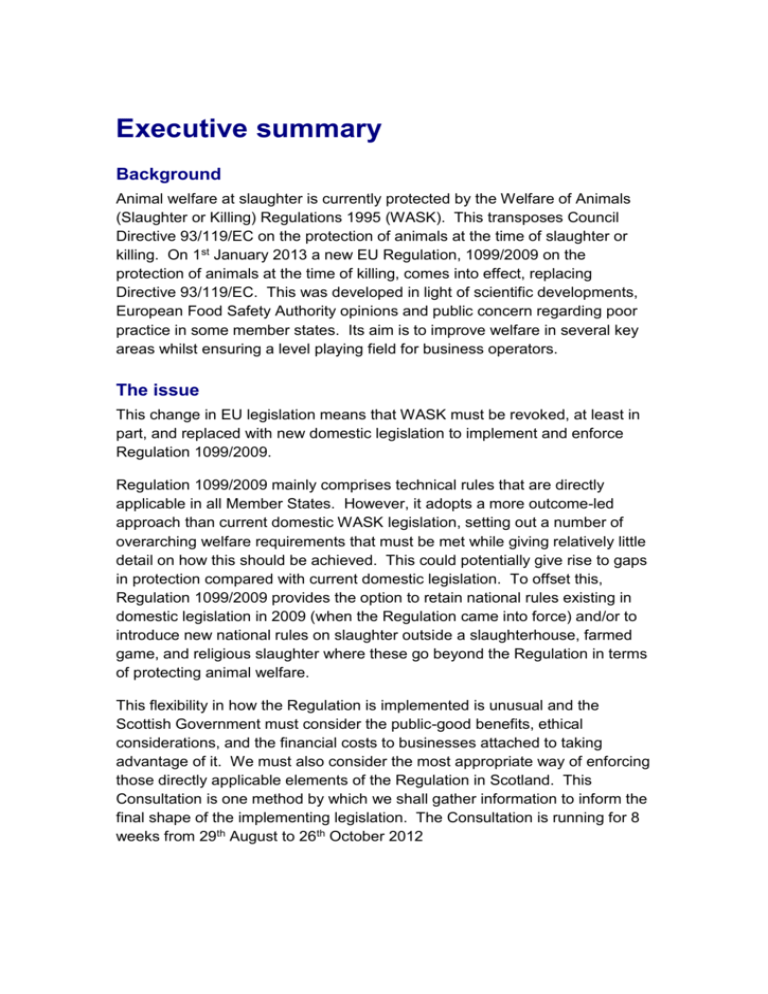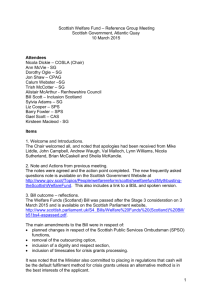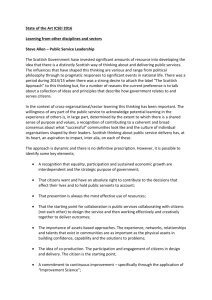Executive summary - The Scottish Government
advertisement

Executive summary Background Animal welfare at slaughter is currently protected by the Welfare of Animals (Slaughter or Killing) Regulations 1995 (WASK). This transposes Council Directive 93/119/EC on the protection of animals at the time of slaughter or killing. On 1st January 2013 a new EU Regulation, 1099/2009 on the protection of animals at the time of killing, comes into effect, replacing Directive 93/119/EC. This was developed in light of scientific developments, European Food Safety Authority opinions and public concern regarding poor practice in some member states. Its aim is to improve welfare in several key areas whilst ensuring a level playing field for business operators. The issue This change in EU legislation means that WASK must be revoked, at least in part, and replaced with new domestic legislation to implement and enforce Regulation 1099/2009. Regulation 1099/2009 mainly comprises technical rules that are directly applicable in all Member States. However, it adopts a more outcome-led approach than current domestic WASK legislation, setting out a number of overarching welfare requirements that must be met while giving relatively little detail on how this should be achieved. This could potentially give rise to gaps in protection compared with current domestic legislation. To offset this, Regulation 1099/2009 provides the option to retain national rules existing in domestic legislation in 2009 (when the Regulation came into force) and/or to introduce new national rules on slaughter outside a slaughterhouse, farmed game, and religious slaughter where these go beyond the Regulation in terms of protecting animal welfare. This flexibility in how the Regulation is implemented is unusual and the Scottish Government must consider the public-good benefits, ethical considerations, and the financial costs to businesses attached to taking advantage of it. We must also consider the most appropriate way of enforcing those directly applicable elements of the Regulation in Scotland. This Consultation is one method by which we shall gather information to inform the final shape of the implementing legislation. The Consultation is running for 8 weeks from 29th August to 26th October 2012 Key points Directly applicable measures Regulation 1099/2009 mainly comprises technical rules that are directly applicable in all Member States. These give rise to changes in, for example: the scope of the legislation, licensing arrangements, management practices, operational practices, and stunning requirements. This consultation outlines in more detail what these changes are, provides a link to the Regulation for further information, but does not seek views on these changes as we have no option but to implement them as they stand. However, work has been undertaken in conjunction with other UK Administrations on proposals for mechanisms to implement these changes in a consistent manner across the UK; for example on training, licensing mechanisms, enforcement, offences and penalties. Views on these aspects are being sought. Certificates of Competence One aspect of the directly applicable measures that will be of particular interest is the transition from WASK slaughter licences to Regulation 1099/2009 Certificates of Competence. The EU Regulation introduces a twostep approach to licensing, with a requirement to undergo training and assessment by a body free from any conflict of interest and to exchange the resulting qualification certificate for a Certificate of Competence. Under the new system, training and assessment to obtain a Certificate of Competence will be independent of the competent authority and will be delivered as a qualification in line with an agreed framework and awarded by independently accredited organisations. Crucially, the requirement for training and a Certificate of Competence will be extended to those handling livestock prior to slaughter, including in lairage. The Scottish Government are working to provide a training framework for Scotland in line with the framework that will be made available in the rest of the UK. Both the framework and any Awarding Organisations will be accredited by the Scottish Qualifications Authority. At this point, it is unlikely that courses will be available before December 2012; we acknowledge that this is far from ideal but propose a mechanism to allow existing workers requiring training under the new Regulation to continue working until they can obtain that training. We are aware of the possible financial implications of this training requirement for small and remote businesses in particular and seek early views on this. Until 8th December 2015, Regulation 1099/2009 allows Member States to establish a simplified approach to issue of Certificates of Competence for staff with three or more years relevant professional experience. The Scottish Government intends to take full advantage of this opportunity in line with the rest of the UK and had been working with Defra and the other Devolved Administrations. Proposals are outlined and views are sought on these. Existing national rules Regulation 1099/2009 allows Member States to maintain national rules existing when the Regulation came into force on 8 December 2009 where these provide more extensive protection of animals at the time of killing than the minimum standards prescribed by Regulation 1099/2009. There are a number of specific areas where the Regulation might be considered to set lower welfare standards than currently apply in the UK - these are outlined in this consultation. The Scottish Government is committed to keeping regulatory burdens to a minimum and would not normally consider the use of national rules to supplement provisions in an EU regulation. However we are also committed to securing good standards of animal welfare. For this reason, and after initial discussion with key stakeholders, our starting principle will be to maintain all existing national rules that go beyond Regulation 1099/2009. The Scottish Government will only consider proposals for the removal of specific national rules where there are valid reasons to do so and where doing so does not compromise animal welfare. This consultation provides you with an opportunity to propose the removal of existing national rules where you consider such action necessary. New national rules Regulation 1099/2009 also allows the introduction of new stricter national rules to improve welfare protection given to animals killed outside a slaughterhouse, farmed game and animals killed by methods prescribed by religious rites. It is Scottish Government policy to avoid imposing unnecessary additional regulatory burdens on industry. However, we are also committed to improving animal welfare. A number of suggestions for new stricter national rules have been made and inclusion of some or all of these suggestions in the implementing legislation will be considered on a case by case basis where there is objective evidence that doing so will significantly improve animal welfare. This consultation gives you the opportunity to comment on the suggestions made to date, and to propose additional or alternative new stricter national rules in these three specific areas. Religious slaughter Slaughter without pre-stunning is permitted for religious purposes by Regulation 1099/2009, but the conditions laid down for welfare protection in this situation are far behind existing UK legislation. The Regulation does allow Member States to impose further conditions or even to ban the practice through national rules. There are obviously strong feelings from both perspectives as to how far this opportunity should be taken. No slaughter without stunning currently occurs in Scotland; however, the Scottish Government recognises the right of members of religious communities to eat meat prepared in accordance with their religious beliefs. We intend to maintain existing national rules on religious slaughter. We will only consider new national rules where there is evidence of a likely beneficial impact on welfare and where to do so does not prevent the production of meat according to religious beliefs. This consultation provides an opportunity to comment on these proposals. Differences within the UK Regulation 1099/2009 is directly applicable to all Member States but the flexibility surrounding national rules means that there is the potential for differences between UK Administrations in a number of areas. Feedback from Scottish stakeholders to date suggests that there is a willingness to go much further to legislate to improve animal welfare at slaughter in Scotland than appears to be the case in some other parts of the UK at present. We feel that this stance should be but we would not wish to create difficulties for the Scottish industry when interacting with the rest of the UK industry. Views on this question are therefore sought. Compulsory CCTV There have been calls for the Scottish Government to make the use of CCTV in slaughterhouses compulsory. We acknowledge that CCTV could provide, alongside other methods, inconspicuous monitoring; however it also has limitations. In addition, an FSA report (May 2012) recently found no significant variation in compliance levels with WASK between those premises with or without CCTV. We are aware that the Scottish Parliament Cross Party Animal Welfare Group has convened a subgroup to take forward a detailed survey on CCTV and we expect to receive recommendations from them, probably in autumn 2012. However, in order to fully appraise the proposal for compulsory CCTV, we would also need to consider the burdens a regulatory approach would place on small and medium size businesses, as well as the overall impact that CCTV might have in reducing welfare abuses in slaughterhouses. Given the time constraints for implementing Regulation 1099/2009, we do not plan to pursue proposals for compulsory CCTV further at this time. However, we may re-visit the matter in future should there be clear objective evidence that making CCTV compulsory would have a significant benefit to welfare monitoring beyond that of methods already available. This consultation seeks views in that context. Conclusion The Scottish Government appreciates that this is a long consultation document; however, we hope that you agree that this is not unnecessarily so. Implementing EU Regulation 1099/2009 is a hugely complex project, and it is crucial that we get as much information from stakeholders and people dealing with the day to day practicalities as possible. We want to ensure that this Regulation is implemented in the most appropriate way for Scotland, and the Scottish Government would very much appreciate your help in determining what Scotland’s approach should be.








